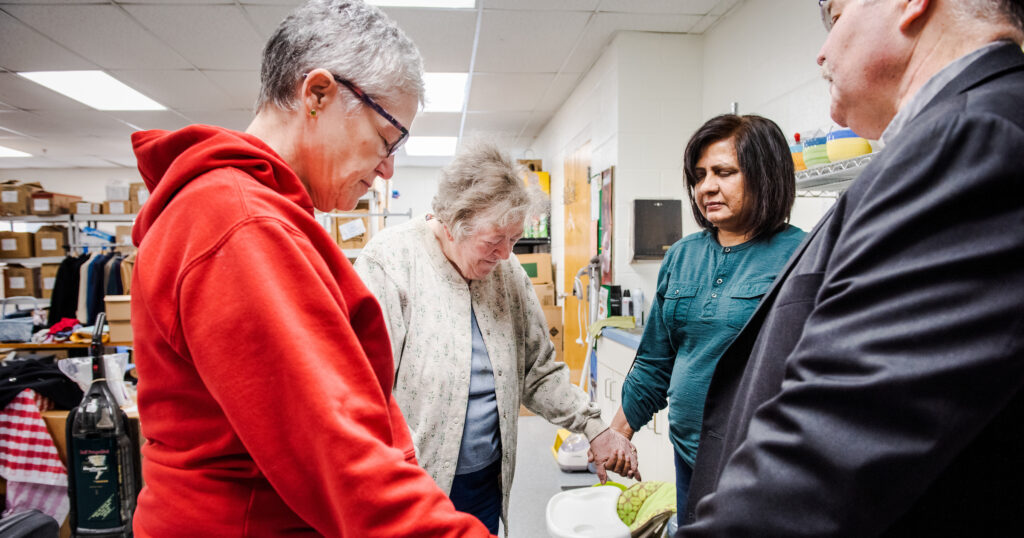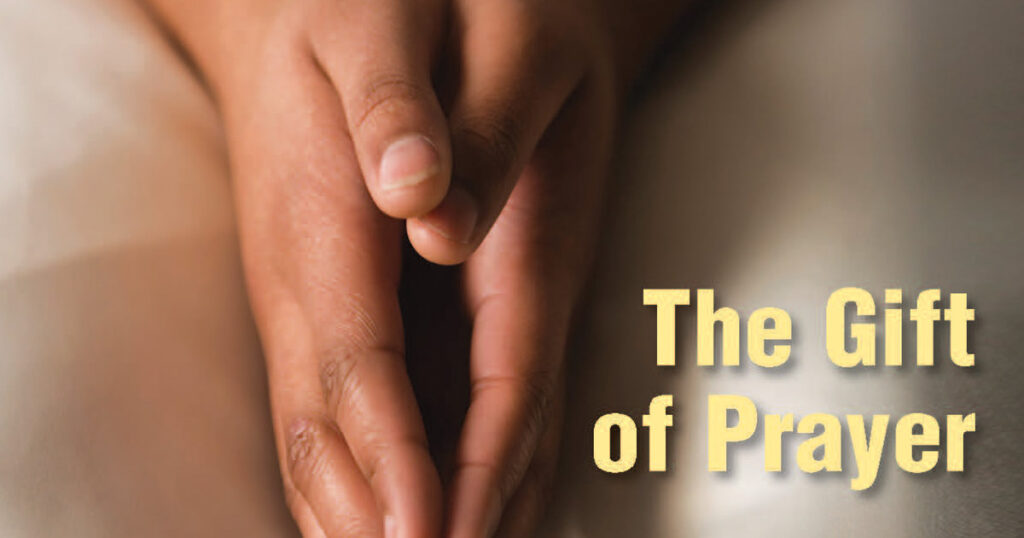Most Christians will be asked to say a prayer out loud at some point in their lives. Whether we are among family, friends, or in public places, most of us feel a level of discomfort if called upon to say a prayer out loud. While we know that all prayers offered in Jesus’ name are heard and answered by our Father in heaven (John 16:23), we also know that when others are listening we need to speak coherently and correctly so that they can be edified and add their “Amen” to ours (1 Cor. 14:16).
In order to be comfortable praying out loud, it is helpful to work through two common obstacles: first, that public prayer is a form of public speaking, and second, that we are often unsure what to ask.
Obstacle 1: Public prayer is a form of public speaking
The main reason people are nervous about praying publicly (that is, out loud in the hearing of others) is that, humanly speaking, public prayer is a form of public speaking. Most people fear public speaking, and especially impromptu public speaking about intimate matters of faith.
To speak well in public requires some sort of a plan. While it is always appropriate to have prayers memorized, such as the Lord’s Prayer and meal prayers, Christians should also prepare themselves to pray for specific circumstances. The way to gain confidence is to have a plan or “scaffold” by which we can write a prayer as we pray it.
There are many such prayer outlines, but the one I use most comes from Acts 1 and the historic collects of the church.
In Acts 1:24–25, the apostles prayed about replacing Judas: “You, Lord, who know the hearts of all, show which one of these two you have chosen to take the place in this ministry and apostleship from which Judas turned aside to go to his own place.” From this apostolic example arose the collects of the church, which have been prayed for thousands of years. Consider, for example, the Collect for the 10th Sunday after Trinity:
O God, You declare Your almighty power above all in showing mercy and pity. Mercifully grant us such a measure of Your grace that we may obtain Your gracious promises and be made partakers of Your heavenly treasures; through Jesus Christ, Your Son, our Lord, who lives and reigns with You and the Holy Spirit, one God, now and forever.
These prayers offer us a scaffold upon which we can construct our own prayers. The collect form has these main parts:
1. The address. In the first example it is simply “Lord,” in the second example, “O God.” Because the options abound, I usually default to “Heavenly Father” to avoid having to think too much about it.
2. The basis for our prayer. This next part of the prayer usually starts with the word “You” and contains a simple statement of who God is and what He has done relevant to what we are about to ask or the situation we are in. In the first example from Acts 1, it is simply “You know the hearts of all,” in the second it is “You declare Your almighty power above all in showing mercy and pity.”
3. The request. Here we simply say what we are asking for (more on this in the next section). In the first prayer, it is “show us which one you have chosen.” In the Collect for Trinity 10, it is “mercifully grant us such a measure of Your grace.”
4. The result. Here we add one or more results we hope will arise from our request, often including God’s praise and our salvation. This part is implied but not stated in the prayer from Acts 1. In the Collect it says “that we may obtain Your gracious promises.”
5. The close. Usually “in Jesus’ name” or “through Jesus Christ our Lord.”
Whenever I walk into a room where I suspect I might be asked to pray, this is the scaffold I am thinking through to help me when the moment comes to pray out loud. In the historic collects, sometimes part 2 or 4 or both are missing. The form is a tool, not a straitjacket. It is a model for situational prayer exemplified for us by the apostles themselves in Acts 1. However unprepared I may feel to pray out loud, I know that if I build off this scaffold I will have said a prayer that was useful and understandable to those waiting to add their “Amen” to mine.
Obstacle 2: We are unsure what to ask
Another common obstacle is that we are often unsure what to ask for. I often feel like those waiting on me to pray expect me to have the wisdom to know exactly what to ask and how the situation should result. But the reality is that we often, even usually, don’t know what to ask for. In fact, Romans 8:26 bluntly states that “we do not know what to pray for as we ought.”
If we fear praying out loud because we don’t even know what to ask for, then we can follow the example of pious King Jehoshaphat in 2 Chronicles 20.
Jehoshaphat was under attack from a massive force of Moabites, Ammonites and others. Trusting in the LORD, he knew it was his responsibility to lead the people in prayer. Humanly speaking, there was no reasonable way to achieve victory. He didn’t even know where to start. Should he ask for a miraculous victory, a safe escape, a merciful surrender, or a quick death? The conclusion of his public prayer is both wise and godly: “We do not know what to do, but our eyes are on you” (2 Chron. 20:12).
Jehoshaphat’s prayer teaches us that we do not have to know what to do or for what to ask. The Holy Spirit intercedes for us since we “do not know what to pray for as we ought” (Rom. 8:26). When asked to pray in the hearing of others, we are in good company with Jehoshaphat if we simply pray: “Lord, we do not even know what to ask for, but our eyes are on you.”
Photo: LCMS Communications/Erik M. Lunsford





Something of a new Christian here, five years in. I heard a similar prayer guide to what Paul K mentioned, but instead of the acronym ACTS, it’s PRAY…Praise, Repent, Ask, Yield:
P(raise) God for his attributes, actions, love for us, salvation, etc.
R(epent) of your sins anew, asking forgiveness for them.
A(sk) for your prayer request, of course in humility, supplication
Y(ield) your desires to God’s plans which are greater than ours and better for us.
If I’m not mistaken, The Lord’s Prayer follows this very same format, so this structure of prayer is God-given, directly. Pretty solid foundation for a prayer structure, no?
Expressing gratitude is also important, even among our petitions, and perhaps especially so. As the Bible urges us, “[I]n everything by prayer and supplication with thanksgiving let your requests be made known to God ” (Phil 4:6 ESV).
A prayer structure that I have occasionally found helpful is represented by the acronym ACTS:
• Adoration: Acknowledging the character and stature of God by which we have reason and confidence to approach him to ask for help or express gratitude, e.g., he is gracious and compassionate and rules over all creation.
• Confession: Recognizing there is nothing that we deserve from God, that we have been remiss in remembering his ongoing love, etc.
• Thanksgiving: Expressing gratitude for particular things or more generally, e.g., that we are his children and he hears us.
• Supplication: Requesting what we believe to be beneficial for ourselves and others.
Pastor Hayes,
Excellent guidelines for public prayer.
I struggle with this myself and will work on following your outline.
BTW St. John’s, Palmer was the church my mother was confirmed in. She was a member of the Peters family.
God’s blessings to you and your congregation.